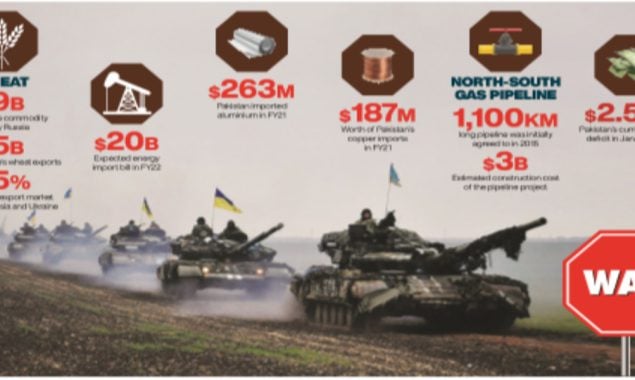Synopsis
Energy crisis is on the cards with renewed fears of inflation and supply chain breakdown

KARACHI: The global economic outlook turned gloomy soon after Russian forces marched into Ukraine. The financial sanctions have rocked Russia’s economy and threaten to fuel further worldwide inflation.
The prices of natural gas, oil, and other staples have jumped in the international markets. At the same time, it has rattled global supply chains that are still struggling to get out of the impact of the Covid-19 pandemic, adding to the rising costs, prolonged deliveries and other challenges for exporters to move goods around the world.
Brent futures were at $115.25 a barrel, while US West Texas Intermediate (WTI) crude traded at $112.85.
Both benchmarks rose to multi-year highs during the session, with Brent soaring to $119.84, its highest since May 2012 and WTI hitting its highest since September 2008 at $116.57.
Global benchmark Brent has jumped nearly 25 per cent since the Russian invasion of Ukraine on February 24. Brent’s six-month spread hit a record high of over $21 a barrel, indicating very tight supplies.
Analysts believe the sanctions against Russia, the world’s second largest natural gas exporter and third largest producer of petroleum, may drive energy prices even higher.
Vijay Valecha, chief investment officer (CIO) of Century Financial, told BOL News that the oil price rally is bad news for the oil importing South Asian economies, which would see an upsurge in their import bill and a widening of the current account deficits.
“Pakistan’s current account deficit surged to a historic high of $2.56 billion in January 2022. A hefty import bill and a drop in the flow of workers’ remittances from overseas Pakistanis were the major factors behind the widening current account deficit. Higher oil prices are also posing a threat to the domestic economic activities and are at the mercy of the Russia-Ukraine developments,” Valecha said.
The Finance Ministry in its monthly economic outlook noted that an escalated Russia-Ukraine crisis could keep inflationary and balance of payments pressures in the economy for a longer period.
“The main risk for Pakistan’s economy is that these developments may further delay the downward correction in inflation and improvement in the current account balance,” the ministry reported.
A KASB Research report noted that Pakistan’s energy import bill is expected to hit $20 billion (a 72 per cent rise on a year-on-year basis) in FY22 because of elevated oil and gas prices.
“On an average, Pakistan imports around 15 million barrels of both crude and refined fuel each month, suggesting a $10/bbl increase in oil prices would enhance Pakistan’s monthly import bill by $150 million. Moreover, Pakistan’s increasing reliance on the regasified liquefied natural gas (RLNG) is expected to exert additional strain on the country’s finances, as both oil prices and RLNG spot prices climb further,” the KASB Research report said. For Pakistan, which is already grappling with a double-digit inflation with fuel and energy prices at a record high, the geopolitical crisis may further strain consumers and affect daily lives.
Realising the gravity of the situation, Prime Minister Imran Khan announced reduction in petrol and diesel prices by Rs10/litre and also Rs5/unit in the electricity tariff until the next budget.
The global oil and commodity prices had already skyrocketed and it was believed they would start coming down but the Ukraine war started, he said.
“Now, I am afraid that the prices will not come down. In the backdrop of the war, the price of oil will also go up. If 30 per cent of the world’s gas comes from there, then its price will also increase. We informed Russia that we need two million tonnes of wheat, but now the price of wheat will go up,” the prime minister added.
Russia is the largest wheat exporter, selling $9 billion worth of the commodity in the international market. Moreover, Ukraine exported around $5 billion worth of wheat, with the two countries responsible for over 25 per cent of the global export market share.
The KASB Research report said that the global wheat prices are on the rise over strong demand and rising input costs, particularly urea.
“Supply disruptions from Russia and Ukraine could push wheat prices to even higher levels,” it noted.
A A H Soomro, an independent analyst, said that the Russia-Ukraine war has serious consequences for Pakistan, besides having an immediate rise in oil, wheat and gas prices.
“There would be a material impact on our import bill, inflation, currency and foreign exchange reserves. The prime minister’s decision to delay the fuel price hike would have fiscal consequences. However, it would be compensated by cutting the Public Sector Development Programme (PSDP) and others,” he said.
“What’s more imperative is the geopolitical alignment. We have a trade surplus, remittances and export markets in the US, EU and pro-West allies. Remaining neutral might have a cost, as well. It’s a nervous path ahead,” Soomro added.
Pakistan must immediately expedite energy diversification and come up with a viable plan to diversify, expand and add value to exports, he said. “Otherwise, the next few years would be stagflationary.”
Apart from agricultural commodities, Russia is the third largest exporter of aluminum to the world; thus, metal supplies will also be hindered in Pakistan. In FY21, the country imported aluminium worth around $263 million.
Within the country, aluminum is used by the packaging industry, auto parts industry, electronics industry, construction industry, etc. Moreover, in FY21, Pakistan exported around $50 million worth of aluminum scraps and products, of which $18 million was in the form of aluminum cans (sold by PABC in the Afghan market).
Pakistan imported copper worth around $187 million in FY21. The commodity is primarily used in cables, automobile industry, construction industry, telecommunications, etc. Moreover, Pakistan exported around $710 million worth of copper products and ores.
Mughal Steel stands as one of the largest copper exporters in Pakistan and is expected to sell around $60 million worth of copper ingots in FY22.
The harsher sanctions imposed on Russia may also dampen Pakistan’s ambitious gas pipeline project in collaboration with the Russian companies, potentially further delaying the pipeline’s construction.
The 1,100km-long pipeline, also known as the North-South Gas Pipeline, was initially agreed to in 2015 and was to be financed by both Moscow and Islamabad, using a Russian company to construct it.
The $3 billion pipeline project is crucial for Pakistan — particularly the power sector — as the country’s dependence on imported LNG grows in the face of dwindling indigenous gas supplies.
Although, if the US imposes any further sanctions of sorts, it may prevent Pakistan from searching for an unsanctioned Russian company to develop the project and will, in turn, be bearish for the South Asian economy.
Read More News On
Catch all the Business News, Breaking News Event and Latest News Updates on The BOL News
Download The BOL News App to get the Daily News Update & Follow us on Google News.




